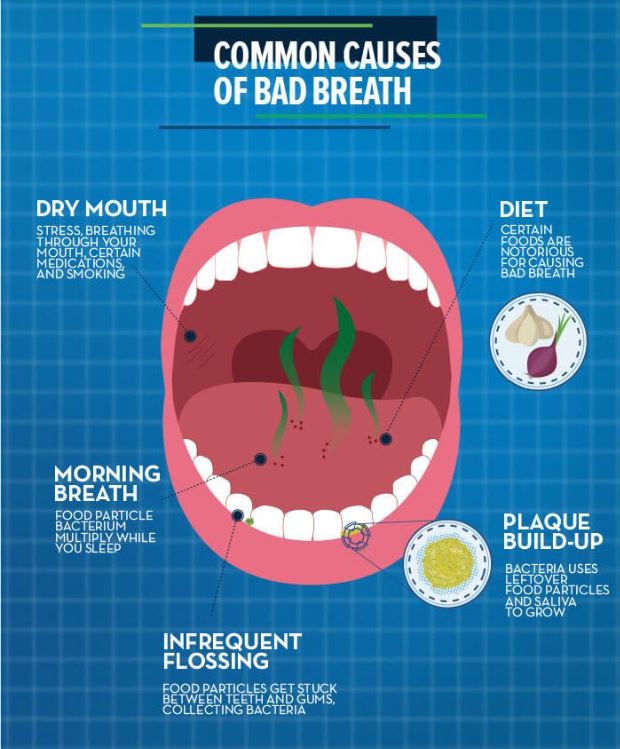No one wants bad breath, so here are a few insights into how it happens and what we can do to prevent it.
CAUSES:
Most bad breath starts in your mouth, and here are some possible causes;
Food. The breakdown of food particles in and around your teeth increases bacteria causing a foul odour. Certain foods like onions, garlic and spices can also cause bad breath as, after digestion, they enter your bloodstream, and affect your breath.
Tobacco products. Smoking can cause its own unpleasant mouth odour, with smokers and oral tobacco users more likely to have gum disease, which is yet another source of bad breath.
Poor dental hygiene. If you don’t brush and floss daily (including your tongue), food particles remain in your mouth, and a colourless, sticky film of bacteria (plaque) forms on your teeth. Plaque irritates your gums, eventually forming plaque-filled pockets between your teeth and gums (periodontitis). This process produces odours. In addition, dentures that aren’t cleaned regularly or don’t fit properly can harbour odour-causing food particles and bacteria.
Dry mouth. Saliva cleanses your mouth, removing particles that cause foul odours. However, a condition called dry mouth can contribute to bad breath if saliva production decreases. Dry mouth occurs during sleep, leading to “morning breath”, and worsens if you sleep with your mouth open. Chronic dry mouth may indicate a problem with your salivary glands and some diseases.
Medications. Some medications can produce bad breath by contributing to dry mouth, while other drugs break down in the body to release chemicals carried on your breath.
Infections in your mouth. Surgical wounds such as oral surgery, tooth removal, tooth decay, gum disease, or mouth sores can cause bad breath.
Other mouth, nose and throat conditions. Bad breath occasionally stems from small stones forming in the tonsils, which can be covered with bacteria that produce odour. Infections or chronic inflammation in the nose, sinuses or throat contribute to postnasal drip, leading to bad breath.
Other causes. Some cancers, and metabolic disorders, cause a distinctive breath odour due to the chemicals they produce. Chronic reflux of stomach acids is associated with bad breath.
PREVENTION:
To reduce or prevent bad breath:
Brush your teeth after you eat. Brush after all meals using fluoride-containing, antibacterial toothpaste at least twice a day, especially after meals. Rinse even if you can’t brush.
Floss at least once a day. Flossing removes food particles and plaque between teeth, helping control bad breath.
Brush your tongue. Your tongue harbours bacteria, so carefully brushing with a toothpaste containing a built-in tongue cleaner reduces odours. If you have a coated tongue with a significant overgrowth of bacteria (from smoking or dry mouth, for example), using a tongue scraper could be of benefit Or use a toothbrush with a built-in tongue cleaner.
MAINTAIN ORAL HYGIENE:
Clean dentures or dental appliances. Those with a bridge or denture need to clean it thoroughly daily or as directed by their dentist. Clean your dental retainer or mouth guard each time before wearing.
Avoid dry mouth. To keep your mouth moist, drink water often, avoiding tobacco, coffee, soft drinks or alcohol. Chew sugarless gum or suck on candy to stimulate saliva. For chronic dry mouth, your dentist may prescribe an artificial saliva preparation or an oral medication that stimulates saliva flow.
Adjust your diet. Avoid foods such as onions, garlic and lots of sugary foods, but consider consuming probiotics and eating more apples are also helpful.
Regularly get a new toothbrush. Choose a soft-bristled toothbrush, changing it every three to four months or sooner if it becomes frayed.
Schedule regular dental checkups. See your dentist twice annually to have your teeth or dentures examined and cleaned.
Quit Smoking.
HELP FROM YOUR DENTIST:
Checking in with your dentist for help with bad breath(halitosis), your dentist will evaluate your medical history, asking:
- When did you first experience bad breath?
- Is bad breath occasional or continuous?
- How often do you brush your teeth, clean dentures, or floss?
- Which foods do you eat most often?
- What medications and supplements do you take?
- What health conditions do you have?
- Do you breathe through your mouth, snore, have allergies or sinus problems?
- What do you suspect might be causing your bad breath?
- Do others notice and comment on your bad breath?
Answering these questions will allow us to work together to make the most of possible solutions. Contact us at Kesteven Dental Care Studio, 604-826-8087 or drkesteven@shaw.ca.
By Lorelei Kesteven


